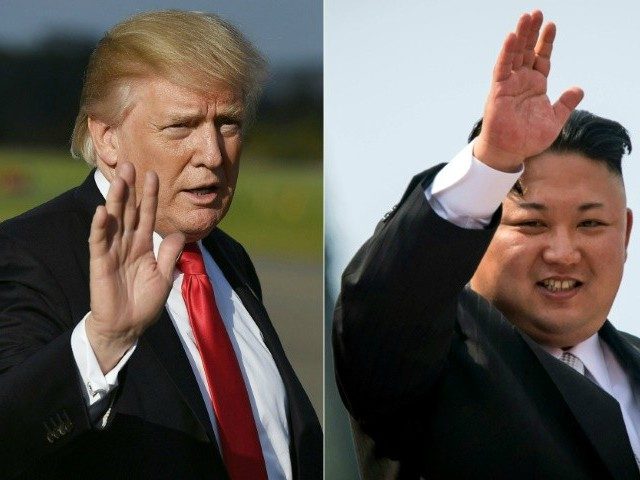North Korean dictator Kim Jong-un on Thursday expressed “great satisfaction” with the “good personal letter” he received from President Donald Trump, praised Trump’s “unusual determination and will” to achieve denuclearization, and ordered preparations to begin for a second U.S.-North Korea summit.
“Upon receiving the good personal letter sent by President Trump, the Supreme Leader expressed great satisfaction. He spoke highly of President Trump for expressing his unusual determination and will for the settlement of the issue with a great interest in the second DPRK-U.S. summit,” reported North Korea’s KCNA news service, as related by South Korea’s Yonhap News. “DPRK” is North Korea’s name for itself.
Kim agreed to “believe in the positive way of thinking of President Trump, wait with patience and in good faith and, together with the U.S., advance step by step toward the goal to be reached by the two countries of the DPRK and the U.S.”
“Expressing satisfaction over the results of the talks and activities done by the DPRK delegation in Washington D.C., the U.S., he set forth tasks and orientation for making good technical preparations for the second DPRK-U.S. summit high on the agenda,” KCNA’s report concluded.
Kim made these remarks after meeting with lead negotiator Kim Yong-chol, who just returned from a trip to Washington where he discussed the second summit with top officials, including Secretary of State Mike Pompeo and President Trump himself.
Trump announced a new summit would be held in late February after speaking with Kim Yong-chol. The location has not been formally announced, but reports indicate Vietnam is the most likely venue.
Attending the World Economic Forum in Davos, Switzerland, on Wednesday, South Korean Foreign Minister Kang Kyung-wha set high expectations for the second Trump-Kim summit, urging Trump and Kim to “deliver concrete results on denuclearization.”
Kang seemed confident the second summit would allow America and North Korea to make “really great big strides” toward denuclearization.
Japanese Foreign Minister Taro Kono was equally eager to see “concrete results” from a second Trump-Kim summit, but relations between South Korea and Japan have become strained in several other areas, a situation Kim can be expected to factor into his preparations for meeting with Trump.
South Korea’s relations with the United States are also a little tense at the moment, particularly on the subject of President Trump’s request for Seoul to shoulder more of the financial burden for maintaining the U.S. troop presence. South Korea’s Chosun Ilbo on Thursday expressed fears that Trump could use his impending summit with Kim to pressure South Korea into meeting his demands, or possibly put U.S. troop reduction on the table when he bargains with the North Korean leader.
“Concrete results” are the almost universal metric by which the second Trump-Kim summit will be judged. In a particularly pessimistic take on the state of nuclear negotiations on Thursday at The Hill, former CIA analyst Soo Kim saw little evidence that North Korea is doing anything better than running its decades-long scam of pocketing concessions in exchange for symbolic gestures, as it waits for the political willpower of its democratic antagonists to fade – but even this glum analysis included a crucial “maybe” that might be addressed by a successful second summit:
The Center for Strategic and International Studies’ recent report on another undisclosed North Korean missile base, in addition to revealing the DPRK’s ongoing missile activity and previously undisclosed sites, again underscores the need for a complete, thorough, encompassing agreement and reminds Washington of the security and diplomatic implications of entering into a less-than-comprehensive nuclear deal with North Korea. The White House publicly maintains its position to continue pressuring Pyongyang with sanctions until the regime takes affirmative steps toward denuclearization, but gradually these buttons may be unclasped to reward North Korea’s “good” behavior.
North Korea’s permutation of negotiating behavior seems once again to be the tried-and-true technique in gradually attenuating its opponents’ determination and thinning their patience through protracted delivery and other time-buying ruses. A couple more gravitational pulls to ultimately attain legitimization as a nuclear state, and then, what next? Wittingly or otherwise, it appears that Washington — enervated and perhaps in want of an “out” — is closer to entertaining greater leniency toward Pyongyang.
His February meeting with Kim will give President Trump a chance to demonstrate that none of those sanctions buttons will be unclasped unless North Korea truly begins verifiable denuclearization, instead of just shutting down a few borderline-irrelevant facilities while refusing to discuss crucial missile bases.
The question will then become how far North Korea must proceed down an irreversible path to giving up nuclear missiles before sanctions relief will be granted. Failure to achieve any concrete results would be politically problematic for both the U.S. and South Korean administrations.

COMMENTS
Please let us know if you're having issues with commenting.